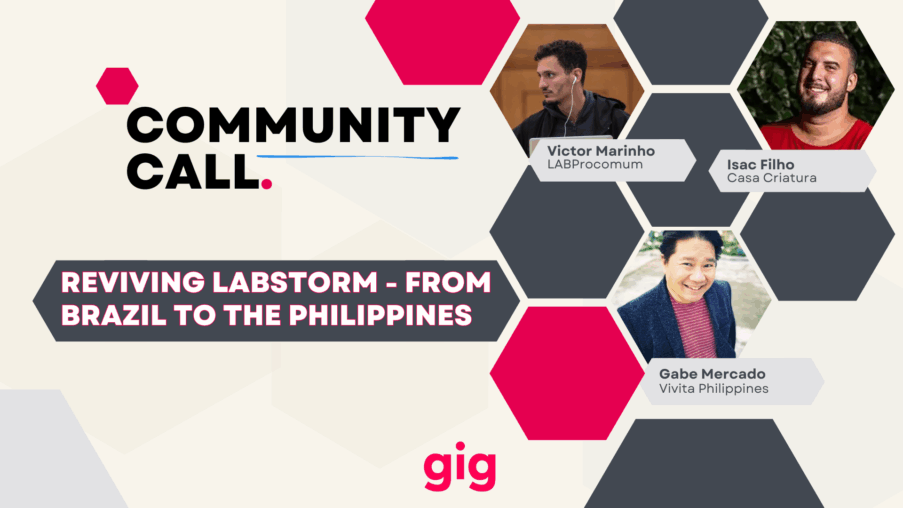What happens when communities facing climate disasters come together to create their own solutions? In our latest GIG community call, we explored an inspiring journey of grassroots innovation that traveled from Brazil to the Philippines, showing how powerful ideas can replicate across the globe.
The call opened with an introduction to LabStorm, a citizen innovation project that began in Brazil in 2023 as a response to devastating floods. LabStorm, also known as Lab Tempestade, is a Climate Action Laboratory that tackles climate change challenges in areas hit by extreme rainfall, specifically São Paulo and the Metropolitan Region of Recife. Casa Criatura joined forces with Instituto Procomum and GIG to prototype ideas and face climate change through the collaboration of community efforts and expert insights.
GIG members Isac Filho from Casa Criatura and Victor Marinho from Instituto Procomum introduced everyone on the call to the LabStorm project. The project addresses the extensive impact of climate-related issues, including severe flooding, environmental disasters, displacement of communities, and loss of lives, while showcasing community-driven solutions to these challenges.
However, what makes LabStorm’s story special is not just the project’s initial success, but how it has created a legacy by inspiring fellow GIG member Gabe Mercado from VIVITA Philippines to replicate it in Baguio City during their local design week. This kind of organic, peer-to-peer knowledge sharing is exactly what makes our global GIG network thrive!
Understanding Citizen Innovation Labs
Victor from Instituto Procomum walked us through the fundamental concepts behind their citizen innovation methodology. Unlike traditional market-driven innovation that seeks competitive advantages, citizen innovation focuses on creating solutions for real community problems. The philosophy is beautifully simple: the people who suffer from a problem are often best positioned to find solutions. We just need to create the space for that to happen. This builds on Eleanor Ostrom’s eight principles of commons management and aims for co-production of public policies with community autonomy.
The LabStorm project’s “Lightning Lab” model consists of an open call around a specific theme, where participants form groups, ideate solutions over two days, develop prototypes for about a month, and then share results.
The Brazilian Experience: Lab Tempestade Olinda
Isaac from Casa Criatura shared how LabStorm emerged after the 2022 floods in Recife. The project took on even deeper meaning when Victor revealed that a Procomum partner had passed away during a flood while trying to save a family, transforming this from a theoretical exercise into a heart-led mission.
The first LabStorm event at Casa Criatura, Lab Tempestade Olinda, united diverse minds to brainstorm innovative climate solutions through an open call to the community to propose actions against the climate crisis. Bringing together different Brazilian cultures, dialects, and approaches, they created a space where vulnerable communities, academics, social scientists, designers, and public officials could work together to develop citizen-led prototypes.
The activities emphasized collaboration over competition, addressing Recife’s climate impacts, community involvement, and sustainable urban development. Contributions varied from preserving ancestral wisdom to devising new communication methods for climate crises. One particularly successful outcome was a communication plan that eventually partnered with the state government during COP30, becoming integrated into public policy across the entire state of Pernambuco.
The Philippine Replication: Design Jam Baguio
Then came the beautiful moment when Gabe explained how he learned about LabStorm during a recent GIG community call and immediately thought he wanted to bring it to the Philippines. The Philippines is the world’s most disaster-prone country according to the 2025 World Risk Index, facing earthquakes, floods, and storms regularly. This situation is compounded by political corruption, with recent scandals involving stolen flood control funds.
Despite having no dedicated funding, Gabe organized a Design Jam at Vivistop Baguio, a makerspace, as the kickoff event for Design Week Baguio. This one-day initiative fused the principles of classic design thinking with engaging insights from Red Cross Red Crescent Climate Centre, all infused with a vibrant, applied improvisation spirit that embraced VIVITA’s innovative and youth-centric approach.
Working with about twelve youth participants, the teams moved through ideation exercises and built low-fidelity prototypes using materials available at Vivistop, focusing on citizen-centered design that real communities can understand, access, and use.
Gabe emphasized that this successful event proved to be a robust proof of concept, demonstrating the immense potential for a full-scale LabStorm initiative in the future. He stressed the need for such a collaborative design effort for the Philippines, as it could generate vital solutions and strategies to enhance citizen-led national resilience.
Looking Forward
The conversation turned to scaling possibilities. Ricardo from GIG noted that projects growing organically from the ground up—like LabStorm’s journey from Brazil to the Philippines—are exactly what meaningful and impactful South-South partnerships are about. The distance between the two countries is literally as far as you can get on Earth; they are antipodes, yet the methodology traveled successfully.
The potential directions and challenges of the LabStorm methodology were also discussed. This included curating a network of climate labs across multiple regions, creating comprehensive documentation in multiple languages, and establishing a blueprint repository for replication.
The LabStorm methodology truly exemplifies the best of maker culture: knowledge shared freely, adapted locally, documented openly, and focused on solving real human problems. From floods in Recife to floods in Baguio, communities are taking innovation into their own hands—not waiting for top-down solutions, but creating the commons together.
Want to get involved or learn more about GIG member projects? Sign up for our newsletter here.


